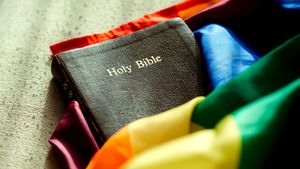A high school
student can pursue nominal damages from an eastern Kentucky
school district over its required antiharassment training,
an appeals court ruled Friday.
The U.S. sixth
circuit court of appeals ruled 2-1 that the Boyd
County school district's policy imposed a
"chill" on student Timothy Allen Morrison's
ability to profess his Christian beliefs and opposition
to homosexuality. The ruling sends the case back to U.S.
district judge David Bunning for a hearing on damages.
Judge Karen Nelson Moore, joined by Judge John R.
Adams, wrote that the allegation of a policy stifling
free speech is enough to allow Morrison to seek damages. To
make his case, the judges said, Morrison must show
that the policy would "deter a person of ordinary
firmness" from exercising free speech rights.
Messages left for
the Alliance Defense Fund, the Scottsdale,
Ariz.-based Christian legal group that
represented Morrison, as well as the American Civil
Liberties Union, which represented the school district, were
not immediately returned. Morrison sued the school
district, claiming that the mandatory antiharassment
training threatened him with punishment for expressing
religious beliefs in opposition to homosexuality. Morrison
is a professed Christian who believes his religion
requires him to speak out against what he sees as
behavior that doesn't comport with his
understanding of Christian morality.
The policy was
later changed to allow students to opt out of the training
and exempt speech that would normally be protected off
campus. In the dissent, Judge Deborah Cook said
Morrison chose not to speak out against homosexuality
and thus didn't risk being punished. Cook said that
Morrison suffered no actual harm from the policy and that
holding a trial for damages to award "a single dollar"
serves no purpose and "trivializes" the business of
the federal courts in protecting the Constitution.
"We cannot find a
school district constitutionally liable for chilling
student speech every time a student chooses caution over
risking possible discipline," she wrote.
The training
sessions were part of a settlement in 2004 of a three-year
dispute between the school district and a now-defunct gay
rights group that wanted recognition as an
extracurricular group. At issue was the federal Equal
Access Act, which says districts can't bar student
groups from access to school facilities based on
religious, political, or philosophical orientation if
the districts let other groups meet on
campus. (Brett Barrouquere, AP)













































































